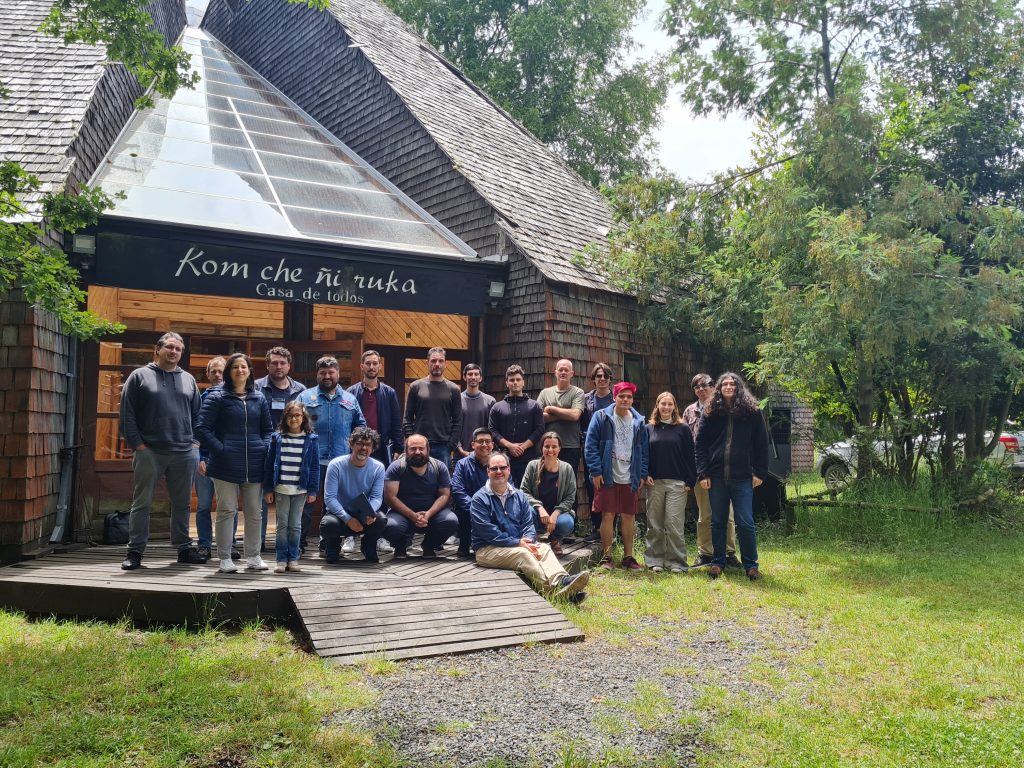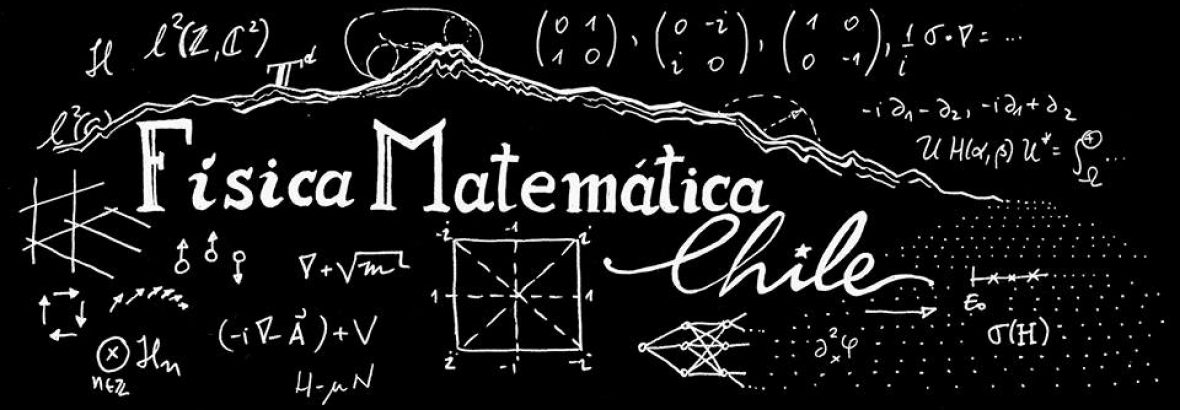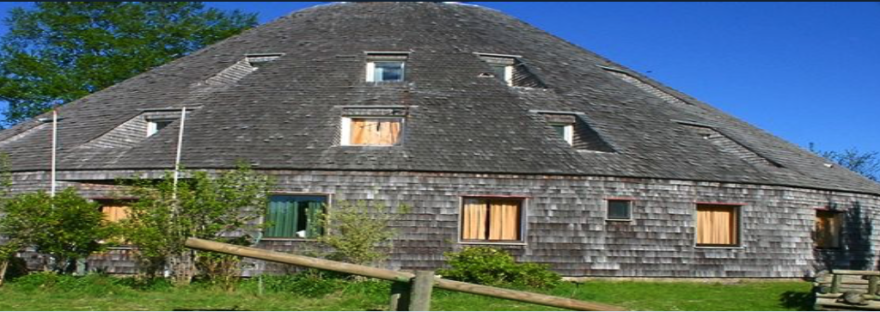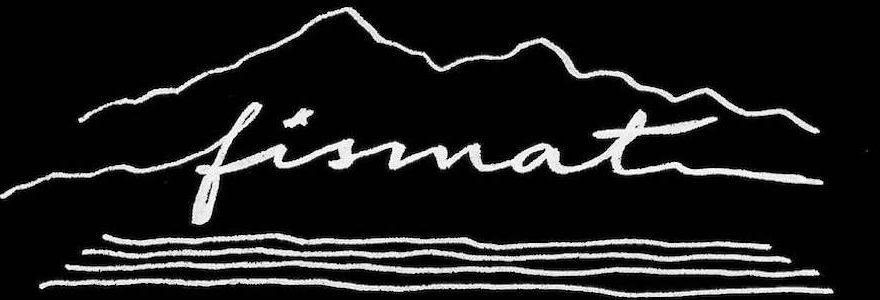From 16th to 18th of December 2024 we will have our first FisMat days in the Ruka in Afunalhue, Campus Villarica of the Pontifical Catholic University of Chile. Poster
Schedule
The following schedule is only tentative and will be adjusted. The idea is to give all participants some space to talk if they want to.
| Time | Mon. 16.12. | Tue. 17.12. | Wed. 18.12. | Thu. 19.12. |
|---|---|---|---|---|
| 8:00 - 9:00 | --- | Breakfast | Breakfast | Breakfast |
| chairman morning | Luis Nuñez | Agustin Baeza | ||
| 9:00-9:40 | Javier Lorca | Dominique Spehner | final discussion | |
| 9:45-10:25 | Fabian Belmonte | Daniel Parra | ||
| 10:30-11:00 | Coffee | Coffee | departure | |
| 11:00-11:40 | Arias Cesar | Hanne van den Bosch | ||
| 11:45-12:25 | Per Sundell | Pablo Miranda | ||
| 12:30-14:00 | Lunch | Lunch | ||
| chairman evening | Camila Saenz | Ignacio Parraguez | ||
| 14:00-14:40 | Julian Calderon | Christian Sadel | ||
| 14:45-15:25 | Santiago Gonzalez | Marouane Assal | ||
| 15:30-16:00 | Coffee | Coffee | ||
| 16:00-16:45 | Arrival | Jorge Acuña | Discussion | |
| 17:00-18:00 | Registration (17:30) | Discussion | Discussion / free time | |
| 18:30-20:00 | Dinner | Dinner | Dinner | |
Participants
| Name | University |
|---|---|
| Acuña, Jorge | PUC Chile |
| Arias, Cesar | PUC Chile |
| Assal, Marouane | USACH |
| Baeza, Augustin | PUC Chile |
| Belmonte, Fabian | U. Católica del Norte |
| Calderon, Julian | PUC Chile |
| De Nittis, Giuseppe | PUC Chile |
| Figueroa, Cristian | USACH |
| Gonzalez, Santiago | PUC Chile |
| Lorca, Javier | U. Frontera |
| Miranda, Pablo | USACH |
| Núñez, Luis | PUC Chile |
| Parraguez, Ignacio | PUC Chile |
| Parra, Daniel | U. Frontera |
| Sadel, Christian | PUC Chile |
| Saenz, Camila | PUC Chile |
| Spehner, Dominique | UDEC |
| Sundell, Per | UNAP |
| Taarabt, Amal | PUC Chile |
| Van Den Bosch, Hanne | CMM, U. Chile |
Talks
Javier Lorca, Higher Abelian Quantum Double Models: Introduction to the Characterization and Classification of the Ground State Subspace
slides
Higher dimensional abelian quantum double models have been shown to be well defined in any finite dimension and exhibit the characteristic behavior of SPT phases models. In this talk, we will introduce the formalism of these models in a pedagogical manner, focusing on the characterization of the topological ground state subspace and briefly presenting its classification scheme. We will discuss the connection of these models with pressing problems in condensed matter physics and quantum computation.
Fabian Belmonte, Explicit Spectral Analysis for Operators Representing the unitary group U(d) and its Lie algebra u(d) through the Metaplectic Representation and Weyl Quantization
slides
abstract in pdf
Arias Cesar, What geometry can teach us about holography?
slides
One of the most fundamental open problems in theoretical physics is the unification of the four elementary interactions into a single theory of quantum gravity. To this end, the holographic principle—the idea that the degrees of freedom that characterize a certain physical system are encoded at the boundary of spacetime—may arguably provide some key insights into our microscopic understanding of gravitational phenomena. In the context of string theory, the holographic principle crystallizes into the celebrated AdS/CFT correspondence, which conjectures that quantum gravity on a negatively curved spacetime (known as anti-de Sitter space, or AdS) is equivalent to a non- gravitational theory (referred to as a conformal field theory, or CFT) which has support on the boundary of spacetime. In this picture, spacetime may be thought of as emerging from the boundary data of the dual theory.
In this talk, we propose an holographic scheme in which dual theories do not necessarily have support on the boundary of spacetime, but they can also be localized on special interior subregions called defects. These are distinguished hypersurfaces that can be thought of as spacetime impurities, and that arguably exhibit all the relevant geometric textures that we find at the boundary of spacetime—including the capability to encapsulate degrees of freedom which can be independently described by means of some quantum field theory. In this proposed framework, spacetime can not only be reconstructed from a boundary theory, but also from dual defect theories that are located in the deep interior of spacetime itself.
Per Sundell, AKSZ quantization of unfolded fields
slides
Quantum fields on spacetime emerges naturally within operator algebras arising from solutions to the Batalin-Vilkovisky master equation formulated in spaces of maps between Q manifolds due to Alexandrov, Kontsevich, Schwarz and Zaboronsky. We describe how the formalism applies to various theories containing gravity in their unfolded form, including higher spin gravity, and its impact on our understanding of holography
Julian Calderon, Sistemas cuánticos a temperatura finita T > 0: Fases de Berry y Uhlmann
slides
En esta charla exploraremos la transición desde la caracterización geométrica del modelo de Ising XY a temperatura T = 0 donde un índice Z_2 se relaciona con una clase de Chern del haz generado por el estado base, hacia el análisis a T > 0. En este régimen, los estados de Gibbs, que son estados quasilibres, permiten asociar operadores positivos invertibles en el espacio de una partícula. Estos operadores generan una holonomía en la fibración de Uhlmann, que, mediante una noción de purificación, puede reinterpretarse geométricamente en términos de fases similares a las de Berry. Veremos cómo, bajo ciertas condiciones, los espectros de las respectivas holonomías coinciden.
Santiago Gonzalez, Topological classification of translation-invariant states.
slides
The Weyl C* algebra provides a model for the field algebra of quantum mechanical systems. Despite containing the essential information from which quantum mechanics can arise, it has “too few elements” in a precise sense, so one is usually led to study the enveloping Von Neumann algebras associated to representations of the Weyl C* algebra. Despite this, any state of these enveloping Von Neumann algebras can be restricted to states of the Weyl C* algebra, so one can still, in principle, use this abstract setting to obtain information about a physical system. In this talk we will cover the concept of states of a C* algebra, and a topological classification of certain families of states of the Weyl C* algebra, and their connection with certain topological invariants of physical systems.
Jorge Acuña, Generalizaciones del Modelo de Kitaev.
slides
Los quantum doble models, propuestos por Kitaev, son modelos de red que tienen aplicaciones a la materia condensada y a la computación cuántica. Los ground state de estos modelos sirven para almacenar información cuántica, ya que están protegidos de perturbaciones locales. Esto los hace buenos candidatos para la creación de memorias cuánticas. Además, los estados excitados de estos modelos se pueden interpretar como cuasipartículas anyónicas.
Estudiamos una forma de definir estos modelos en complejos simpliciales. Mostraremos que la dimensión del \textit{ground state} depende solamente de la topología del espacio donde se define el modelo. Además, mostraremos una manera sistemática para calcular esta dimensión.
Dominique Spehner, Bures geodesics on the manifold of quantum states.
slides
This talk is devoted to the geodesics on the open manifold of invertible quantum states equipped with the Bures distance studied by A. Uhlmann and collaborators. Generalizing previous works, we determine the explicit form of these geodesics for finite dimensional Hilbert spaces and study their intersections with the boundary. Remarkably, all the geodesics are closed.
Our main result shows that the geodesics are not purely mathematical objects but correspond to physical non-Markovian evolutions of the system coupled to its environment. Moreover, we show that the Ulhmann holonomy of the geodesics is non-trivial and presents topological kicks, characterized by jumps of the phase from 0 to pi when the geodesic passes through a state orthogonal to the initial state.
Daniel Parra, Eigenvalue Asymptotics near a flat band.
slides
In this talk we start by briefly discussing the existence of flat band for discrete periodic structures. Then, we will focus our attention to a Dirac-type operator on $\mathbb{Z}^n$ perturbed by a multiplication operators by slowly decaying function. We show that the eigenvalues accumulate near the value of the flat band at a `semiclassical’ rate with a constant that encodes the structure of the flat band.
Hanne van den Bosch, Edge modes at soft walls.
slides
The spectrum of a periodic Hamiltonian, such as the Wallace model for graphene or the SSH chain in dimension 1, consists of absolutely continuous bands.
When such a Hamiltonian is confined to a halfspace, additional points can appear in the spectrum. They are exponentially decaying away from the interface and thus called edge modes.
The edge states correspond to eigenvalues of the Bloch Hamiltonian. One way to show their existence is through spectral flow methods.
In this talk, I will introduce these methods for the case of a discrete hamiltonian where the confinement is due to a bounded potential diverging to plus infinity on one side. This is based on joint work with David Gontier and Camilo Gomez.
Pablo Miranda, Asintótica de valores propios para operadores de Dirac magnéticos en dos dimensiones
slides
En esta charla, presentamos resultados sobre la distribución de valores propios para operadores de Dirac magnéticos bidimensionales. Consideramos operadores con campo magnético constante, con perturbaciones eléctricas y magnéticas que tienen soporte compacto. Derivamos fórmulas asintóticas de tercer orden que incorporan una propiedad geométrica del soporte de la perturbación. Notablemente, nuestro enfoque nos permite considerar algunas perturbaciones que no necesariamente tienen signo fijo, lo cual constituye una de las principales novedades de nuestro trabajo.
Christian Sadel, Transfermatrix methods for m-channel unitary operators.
slides
Transfermatrix methods have been extremely useful in one-dimensional systems like one-dimensional discrete Schrödinger operators or one-dimensional quantum walks. In the Hermitian case such methods have been generalized first to a certain ‘one-channel’ scheme and later to any locally finite hopping Hermitian operator (including higher dimensional discrete Schrödinger operators) giving a formula for the spectral measure at some designated root of the graph. This also implies criteria for delocalization. In the unitary world we recently developed the analogue of the one and m-channel scheme.
Marouane Assal, Crossings of classical trajectories and quantum resonances for Schrödinger systems
slides
In physics, the notion of quantum resonances goes back to the very beginnings of quantum mechanics. It was proposed to explain results in scattering experiments, and it is associated to the notion of pseudo-particles with finite lifetime. To some extent, it is reasonable to think of resonances as complex numbers which are generalized eigenvalues of quantum observable. The imaginary part of a resonance is interpreted as the inverse of the lifetime of the pseudo-particle it is associated with. Thus, the closer they are to the real axis, the more meaningful they should be.
I will present some recent results on the semiclassical asymptotic distribution of resonances for systems of Schrödinger operators with crossings of the underlying classical trajectories.
Organizers
Christian Sadel and Giuseppe De Nittis.
Sponsors
The event is sponsored by the Mathematics Faculty of the Pontifical University of Chile

Group Picture



